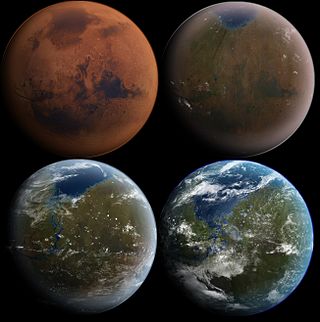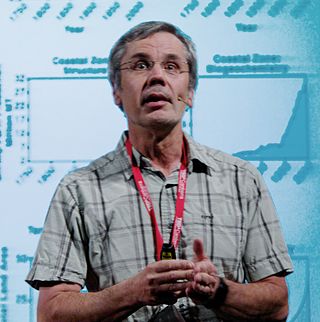Related Research Articles

The Holocene extinction, or Anthropocene extinction, is the ongoing extinction event caused by humans during the Holocene epoch. These extinctions span numerous families of plants and animals, including mammals, birds, reptiles, amphibians, fish, and invertebrates, and affecting not just terrestrial species but also large sectors of marine life. With widespread degradation of biodiversity hotspots, such as coral reefs and rainforests, as well as other areas, the vast majority of these extinctions are thought to be undocumented, as the species are undiscovered at the time of their extinction, which goes unrecorded. The current rate of extinction of species is estimated at 100 to 1,000 times higher than natural background extinction rates and is increasing. During the past 100–200 years, biodiversity loss and species extinction have accelerated, to the point that most conservation biologists now believe that human activity has either produced a period of mass extinction, or is on the cusp of doing so. As such, after the "Big Five" mass extinctions, the Holocene extinction event has also been referred to as the sixth mass extinction or sixth extinction; given the recent recognition of the Capitanian mass extinction, the term seventh mass extinction has also been proposed for the Holocene extinction event.

Space colonization is the process of establishing human settlements beyond Earth for prestige, commercial or strategic benefit, in contrast to space exploration for scientific benefit. Colonialism in this sense is multi-dimensional, including the exploitation of labor, resources and rights.

Terraforming or terraformation ("Earth-shaping") is the hypothetical process of deliberately modifying the atmosphere, temperature, surface topography or ecology of a planet, moon, or other body to be similar to the environment of Earth to make it habitable for humans to live on.
In linguistics, a neologism is any newly formed word, term, or phrase that has achieved popular or institutional recognition and is becoming accepted into mainstream language. Most definitively, a word can be considered a neologism once it is published in a dictionary.
The Anthropocene is a now rejected proposal for the name of a geological epoch that would follow the Holocene, dating from the commencement of significant human impact on Earth up to the present day. It was rejected in 2024 by the International Commission on Stratigraphy in terms of being a defined geologic period. The impacts of humans affect Earth's oceans, geology, geomorphology, landscape, limnology, hydrology, ecosystems and climate. The effects of human activities on Earth can be seen for example in biodiversity loss and climate change. Various start dates for the Anthropocene have been proposed, ranging from the beginning of the Neolithic Revolution, to as recently as the 1960s. The biologist Eugene F. Stoermer is credited with first coining and using the term anthropocene informally in the 1980s; Paul J. Crutzen re-invented and popularized the term. However, in 2024 the International Commission on Stratigraphy (ICS) and the International Union of Geological Sciences (IUGS) rejected the Anthropocene Epoch proposal for inclusion in the Geologic Time Scale.

Naomi Oreskes is an American historian of science. She became Professor of the History of Science and Affiliated Professor of Earth and Planetary Sciences at Harvard University in 2013, after 15 years as Professor of History and Science Studies at the University of California, San Diego.

References to climate change in popular culture have existed since the late 20th century and increased in the 21st century. Climate change, its impacts, and related human-environment interactions have been featured in nonfiction books and documentaries, but also literature, film, music, television shows and video games.

Glenn A. Albrecht, born in 1953, was Professor of Sustainability at Murdoch University in Western Australia until his retirement in 2014. He is an honorary fellow in the School of Geosciences of the University of Sydney.

Planetary boundaries are a framework to describe limits to the impacts of human activities on the Earth system. Beyond these limits, the environment may not be able to self-regulate anymore. This would mean the Earth system would leave the period of stability of the Holocene, in which human society developed. The framework is based on scientific evidence that human actions, especially those of industrialized societies since the Industrial Revolution, have become the main driver of global environmental change. According to the framework, "transgressing one or more planetary boundaries may be deleterious or even catastrophic due to the risk of crossing thresholds that will trigger non-linear, abrupt environmental change within continental-scale to planetary-scale systems."

Crawford Lake is a lake near the community of Campbellville, in the town of Milton, Regional Municipality of Halton, Ontario, Canada. It is located within Crawford Lake Conservation Area, a Regionally Environmentally Sensitive Area, an Ontario Area of Natural and Scientific Interest, and part of the Niagara Escarpment World Biosphere Reserve.

William Lee Steffen was an American-born Australian chemist. He was the executive director of the Australian National University (ANU) Climate Change Institute and a member of the Australian Climate Commission until its dissolution in September 2013. From 1998 to 2004, he was the executive director of the International Geosphere-Biosphere Programme, a coordinating body of national environmental change organisations based in Stockholm. Steffen was one of the founding climate councillors of the Climate Council, with whom he frequently co-authored reports, and spoke in the media on issues relating to climate change and renewable energy.

Earth system governance is a broad area of scholarly inquiry that builds on earlier notions of environmental policy and nature conservation, but puts these into the broader context of human-induced transformations of the entire earth system. The integrative paradigm of earth system governance (ESG) has evolved into an active research area that brings together a variety of disciplines including political science, sociology, economics, ecology, policy studies, geography, sustainability science, and law.

Climate fiction is literature that deals with climate change. Generally speculative in nature but inspired by climate science, works of climate fiction may take place in the world as we know it, in the near future, or in fictional worlds experiencing climate change. The genre frequently includes science fiction and dystopian or utopian themes, imagining the potential futures based on how humanity responds to the impacts of climate change. Climate fiction typically involves anthropogenic climate change and other environmental issues as opposed to weather and disaster more generally. Technologies such as climate engineering or climate adaptation practices often feature prominently in works exploring their impacts on society.

The effects of climate change on mental health and wellbeing are being documented as the consequences of climate change become more tangible and impactful. This is especially the case for vulnerable populations and those with pre-existing serious mental illness. There are three broad pathways by which these effects can take place: directly, indirectly or via awareness. The direct pathway includes stress-related conditions caused by exposure to extreme weather events. These include post-traumatic stress disorder (PTSD). Scientific studies have linked mental health to several climate-related exposures. These include heat, humidity, rainfall, drought, wildfires and floods. The indirect pathway can be disruption to economic and social activities. An example is when an area of farmland is less able to produce food. The third pathway can be of mere awareness of the climate change threat, even by individuals who are not otherwise affected by it. This especially manifests in the form of anxiety over the quality of life for future generations.

Patrick Reinsborough is an American activist, writer, social change theorist and practitioner. He is the co-author of Re:Imagining Change: How to Use Story-based Strategy to Win Campaigns, Build Movements and Change the World and contributor to social movement anthologies including Globalize Liberation: How to Uproot the System and Build a Better World and Beautiful Trouble: A Toolbox for Revolution.

Extinction Rebellion is a UK-founded global environmental movement, with the stated aim of using nonviolent civil disobedience to compel government action to avoid tipping points in the climate system, biodiversity loss, and the risk of social and ecological collapse. Extinction Rebellion was established in Stroud in May 2018 by Gail Bradbrook, Simon Bramwell, Roger Hallam, Stuart Basden, along with six other co-founders from the campaign group Rising Up!
Eco-anxiety is a challenging emotional response to climate change and other environmental issues. Extensive studies have been done on ecological anxiety since 2007, and various definitions remain in use. The condition is not a medical diagnosis and is regarded as a rational response to the reality of climate change; however, severe instances can have a mental health impact if left without alleviation. There is also evidence that eco-anxiety is caused by the way researchers frame their research and their narratives of the evidence about climate change: if they do not consider the possibility of finding any solution to overcome climate change and for individuals to make a difference, they contribute to this feeling of powerlessness.
Ecological grief, or in particular climate grief, refers to the sense of loss that arises from experiencing or learning about environmental destruction or climate change. For example, scientists witnessing the decline of Australia's Great Barrier Reef report experiences of anxiety, hopelessness, and despair. Groups impacted heavily also include young people feeling betrayal from lack of environmental action by governments and indigenous communities losing their livelihoods.
The term collapsology is a neologism used to designate the transdisciplinary study of the risks of collapse of industrial civilization. It is concerned with the general collapse of societies induced by climate change, as well as "scarcity of resources, vast extinctions, and natural disasters." Although the concept of civilizational or societal collapse had already existed for many years, collapsology focuses its attention on contemporary, industrial, and globalized societies.
References
- ↑ "MARSIFICATION, MARSIFY". Bureau of Linguistical Reality. January 27, 2015.
- ↑ "Alicia Escott". aliciaescott.com. Retrieved 2024-03-08.
- ↑ Datta, Sukanya (2023-06-16). "Name that feeling: Two artists coin words for climate change". Hindustan Times. Retrieved 2024-03-08.
- ↑ H., S. (2018-06-19). "At a loss for words? Join the Bureau of Linguistical Reality". The Economist. ISSN 0013-0613 . Retrieved 2024-03-08.
- ↑ "Climate change has started to influence our language. Here's how". ABC News. 2019-05-29. Retrieved 2024-03-08.
- ↑ Magazine, Smithsonian; Gachman, Dina (2022-10-04). "How Two California Artists Can Help Personalize Your Eco-Grief". Smithsonian Magazine. Retrieved 2024-03-08.
- ↑ Millner, Caille (2018-05-11). "When old words can't describe reality, find new ones". San Francisco Chronicle. Retrieved 2024-03-08.
- ↑ Fisher, Richard (2023-01-26). "Why we need new words for life in the Anthropocene". www.bbc.com. Retrieved 2024-03-08.
- ↑ Else, Liz (2023-12-12). "Science and technology's newest words and what they tell us about 2023". New Scientist.
- ↑ "BBC Radio 4 - Short Cuts, Earth, Water, Sky". BBC. Retrieved 2024-07-23.